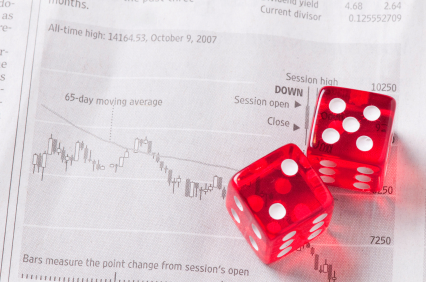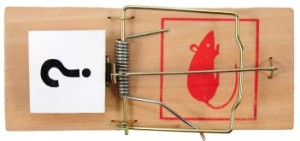There have been a spate of articles in the financial media recently encouraging retirees to catch up on savings shortfalls by investing as much as 40-60% of their nest egg in the stock market.
These “experts” promote the concept as if it makes perfect sense to make up for your gambling losses by doubling your bets.

To me, it’s appalling that anyone would advise those who are already retired to gamble their life’s savings on the volatile, risk-filled world of Wall Street.
But my message – that Wall Street is unstable and potentially as explosive as nitroglycerin – is really not age specific. The stock market can (and will) blow up in your face at any age.
For most Americans – and Wall Street goes to great lengths to hide this truth – the stock market is a promise unmet.

The success myth hyped by the financial services industry is like a casino showcasing its big winners, without mentioning that the prize pool derives from the much larger pool of losers who generate huge profits for the operators, but who themselves walk away worse off than if they had stayed at home.
Money isn’t the only price that the Wall Street casino extracts from most investors
Peace of mind is surely as much a toll. When it comes to steep ups-and-downs and hairpin curves, the stock market is unrivaled by even the most infamous amusement park rollercoasters.

Yet the rollercoaster metaphor only goes so far. For while both Wall Street and theme park thrill rides will set your head spinning and sometimes rocket your stomach into your mouth, only one guarantees a safe, predictable, rapid landing back where you began. The other never does.
The Wall Street propaganda machine is so mighty and so effective, that most Americans continue to buy into the myth that the stock market – over the long-term – is the best place to grow personal wealth. That’s the case, amazingly, even for the tens of millions of Americans whose own money-losing experiences repeatedly prove otherwise.

It’s time to let the “Big Secret” out of the bag: You Are Not Alone. Your eyes, and your personal experience, are not deceiving you. King Wall Street really is not wearing any clothes. Those who say it is are too afraid to admit that they too have been snookered by the promoters who always manage to get paid, whether you win or lose.
There are loads of numbers and statistics to validate my point. (Although I’ll bet that most people reading this column don’t need me to reaffirm what their own stock market misadventures have already proven.)
Here’s an example of the reality versus hype facts that Wall Street wants you to overlook:
The stock market has plunged more than 45% – TWICE – over the past decade. You may not vividly remember the sting of the last crash, but don’t fool yourself into thinking it isn’t going to happen again.
Even in bull markets, if you are like the average investor, you will wait too long to buy and then compound your misery by selling after the bubble has inevitably burst. What money you do manage to preserve could very well be subject to fees and taxes that will chew up a hefty chunk of what should have been yours. What’s left, the scraps, will be your only financial legacy.

So why do so many Americans continue to cling to the notion that Wall Street offers them the best hope of wealth creation?

The main reason is that no safe, non-volatile alternative has yet been able to penetrate the fortress that Wall Street and its promoters have successfully built around the collective consciousness of the American public.
Put another way: There may be a better mousetrap, but it won’t do you much good if you are prevented from knowing it exists.
After investigating more than 450 different financial products and strategies, I know a better way does exist – it’s called Bank On Yourself and it works for old and young alike. It works for those who start out rich and those who start out wanting to be rich. And, best of all, it has worked flawlessly for more than 160 years.
IT’S NOT TOO LATE TO RESCUE YOUR FINANCIAL PLAN!
Find out how much money you could count on having in retirement if you added Bank On Yourself to your financial plan when you request a FREE Analysis.
My research led me to conclude that Wall Street has brainwashed the American public into believing we must accept risk and volatility in order to grow a sizeable nest-egg.
Of course, I’ve taken a lot of flak for taking on the financial fat cats. But the $100,000 cash reward I’ve offered to the first person who can show they have a better strategy remains unclaimed after nearly three years.
As Benjamin Franklin noted…
You will observe with concern how long a useful truth may be known and exist, before it is generally received and practiced on.”
Make no mistake: If you don’t know what your retirement account will be worth in 10 or 30 years, you don’t have a financial plan. And if you don’t know how much income you can count on from your investments in retirement, you don’t have a plan. You are gambling.
So whether you are in or nearing retirement, or just starting out on your career path, I urge you to do your research and leave the rollercoaster rides to the amusement parks. Let Wall Street grow even richer using someone else’s hard-earned savings.
Want to Know What Your Nest Egg Will Be Worth on the Day You Want to Retire?
If you haven’t requested a free Bank On Yourself Analysis, please do it today. It will show you how you could reach your financial goals and dreams in the shortest time possible… and turn your back on the stomach-churning ups and downs of Wall Street and other investments.
If you’re wondering where you’ll find the money to fund your plan, take heart. There are at least eight common ways to free up funds. When you request your Analysis, you’ll also get a referral to a Bank On Yourself Professional. These specialists (only 200 in the country qualify) are masters at helping people restructure their finances to free up seed money to fund a plan, so don’t count yourself out! Request your Analysis today.



Hi Pamela,
Thank you for the interesting blog. One item of particular interest to me is what you said about the average investor. You said “… if you are like the average investor, you will wait too long to buy and then compound your misery by selling after the bubble has inevitably burst. What money you do manage to preserve could very well be subject to fees and taxes that will chew up a hefty chunk of what should have been yours.”
Do you feel that this is less a problem with what happens on Wall Street and more of a problem that too many individuals, who aren’t professional money managers, try to manage their own investments? I would agree too many investors miss the timing and buy high then sell low. Historically, over the long term, an Andex chart will demonstrate that all classes of risk in investments have earned a positive return.
I also am curious about how a ‘Bank on Yourself’ program can help me grow my nest egg without utilizing the evil empire of Wall Street depicted in your post? I have read your book and enjoyed the content of the strategy once I was able to get through some of the anecdotal rhetoric.
Although I was still unclear on the exact name of the instrument, it seems to me that you are recommending a type of permanent tax shelter like a Universal Life policy. If that is the case, then a ‘BOY’ program does not in fact avoid the risk of investing to grow savings tax deferred… it relies on it.
I am hoping you can help me clarify your thoughts.
Thanks in advance.
S.
Actually, Stacy, research shows that MOST professional money managers ALSO buy and sell at the wrong times – after all, we’re all humans and this a human problem.
I must have mentioned the name of the product in my book over 100 times – specially designed, dividend-paying whole life insurance. I only recommend that life insurance product for this concept because it comes with more guarantees than any other life insurance product and has proven it can deliver on its promises for more than 160 years.
Pamela, what happens if the administrators of your government, Wall Street and the Fed collapse our dollar. What can the B.O.Y. do for us? Will it preserve our wealth like perhaps bullion? Thank you.
Stephen
Stephen, I’ve addressed these concerns in this very thought provoking article.
Hi Stephen, just a way to stimulate thought on the subject….Even in the event of total collapse…why would one want an inert metal anyway? I mean…if the sky did fall what good is gold or silver…heck even copper for that matter?
One can not eat bullion….but only preserve “wealth” from the past.
There in lies the thought of buying it at all…why not just buy the means of production….now that is TRUE wealth!
Then all those that buy gold today…will pay for your goods or services later….
Good points, Will.
Great article! It reminded me of my economics classes (micro and macro). More Particular the diagrams most profs like to draw to simplify markets…the “Circular Flow Model”.
I remember thinking about that in the back of my mind about everyone and their mother trying to save a little to have a retirement….but my question is if everyone is in the same boat waiting for the stock to rise….where does the money come from? Savers…Spenders? What happens when either one runs out of steam? Its all speculation.
Another factor is survivorship bias…which is an article in of itself. This is where failure is overlooked..For example, the list of Dow stocks today is WAYYYY different than when it first started…wonder how they can get away with this, and if it inflates the old…8-10% yearly marketing poster!
Bank On Yourself is great if you have a job. I found out about BOY as I retired and the info and conversations I had with a BOY advisor is pretty much meaningless when your on a pension.
If you’re looking at BOY and you have a job with post tax $$$, take a good look at what they’re saying. It could be the answer to your retirement dreams!
Rick, there is a variation of the whole life policy often used for people who are already retired but it isn’t appropriate for everyone – you fund it with a single lump sum.
You may want to discuss that option with your Bank On Yourself Advisor